Florida's Wildflowers
Yellow
Largeflower Primrose-willow, Seaside Primrose-willow, Coastalplain Goldenaster, Chapmans Goldenrod, Golden-club, Canna, Florida False Sunflower, Hooded Pitcherplant, Walter's Groundcherry, Common Purslane, Bitterweed, Country Mallow, Yellow Allamanda
Largeflower Primrose-Willow - Ludwigia grandiflora
_small.jpg)
Family - Onagraceae
Habitat - Marshes, Swamps, Lake & Pond margins
Description - Introduced emergent/aquatic herbaceous perennial from South America. May grow as floating mats or upright to over 6 feet tall. Can be invasive. Stems and leaves sometimes have short hairs. Flower is showy, yellow, 2 inches wide with 5, or occasionally 4 petals. Generally referred to as a weed.
Seaside Primrose-Willow - Ludwigia maritima
_small.jpg)
Family - Onagraceae
Habitat - Wet Flatwoods, Marshes, Swamps, Banks of streams, ponds, disturbed areas on wet/moist soils.
Description - One of 30 species of the genus Ludwigia in Florida, this native herbaceous plant grows to about 3 feet tall & can be found throughout the state.
Flower - Yellow, with 4 petals & a little over an inch across, produced from spring through fall.
Coastal-plain Goldenaster - Chrysopsis scabrella
%20_small.jpg)
Family - Asteraceae
Habitat - Sand Pine Scrub, Rosemary Scrub, Oak Scrub typically on dry sandy soils.
Description - Native annual herbaceous wildflower to 18 inches high, basal rosette of obovate to spatulate, rough textured leaves. Stems leaves are sessile and lanceolate.
Flower - Yellow disk flower.
Chapman's Goldenrod - Solidago odora Aiton var. chapmanii
Cronquist)%20_small.jpg)
Family - Asteraceae
Habitat - Pinelands, Sandhill, Scrub, in open areas on well drained sandy soils.
Description - Native, perennial herbaceous wildflower to 3 feet tall. Leaves elliptic, acute apices, short petioles, margins entire, may be undulate.
Flower - Numerous yellow flowers on spikes.
Golden-club, Neverwet - Orontium aquaticum
_small.jpg)
_small.jpg)
_small.jpg)
Family - Araceae
Habitat - Shallow water and margins of bogs, marshes, swamps, and streams.
Description - Native Florida herbaceous perennial, the broad blue-green glaucous leaves arising from a thick rhizome (rootstock), 12 - 18 inches high, grows in sun to medium shade and may be immersed or in perpetually wet soils. Flowers are on stalks growing separately from leaves in spring followed by blue-green berries.
Canna, Bandana of the Everglades - Canna flaccida


Family - Cannaceae
Habitat - Open areas of marshes, margins of swamps and lakes, seasonally flooded Pine Flatwoods.
Description - Florida Native perennial herbaceous plant, leaves are glaucous, elliptic to lanceolate and 19 - 20 inches tall. Raceme inflorescence bearing 2 -3 inch long showy yellow flowers in summer.
Florida False Sunflower - Phoebanthus grandiflorus
_small.jpg)
_small.jpg)
_small.jpg)
Family - Asteraceae
Habitat - Sandhill, Dry pine flatwoods
Description - Herbaceous perennial wildflower to 3 feet +/- , endemic, frequent in central Florida - rarely found in South Florida. Sparsely branched stems, leaves are linear to lanceolate, mainly alternate but occasionally appear as approximately opposite. Blooms March through November.



Hooded Pitcher plant - Sarracenia minor
Family - Sarraceniaceae
Habitat - Wet flatwoods, Bogs, Marshes
Description - This Florida native Pitcher plant, is listed as threatened and is the southern most member of the species. Growing to 24 inches tall it produces stalked, 3 inch yellow flowers with five drooping petals arranged in an umbrella-like fashion in springtime. The tubular leaves trap ants & other small insects where they are slowly digested to supply nutrients to the plant.


Common Sow-thistle - Sonchus oleraceus L.
Family - Asteraceae
Habitat - Ruderal, Flatwoods
Description - Introduced herbaceous annual, basal rosette of leaves followed by stem leaves that are variable in shape and margin type, characterized by prickles at margins. Yellow flowers are produced year round in Florida.



Walter's Groundcherry - Physalis walteri
Family - Solanaceae
Habitat - Well drained sandy soils of Pinelands and coastal areas behind the dune line.
Description - Walter's groundcherry is a low growing, perennial native plant. Height is generally 12 inches or less, leaves are opposite, lanceolate, and 3-5 inches long. Flower is pendulant, pale yellow followed by a yellow to orange, papery capsule that contains a single green to yellow berry.
Common purslane - Portulaca oleracea
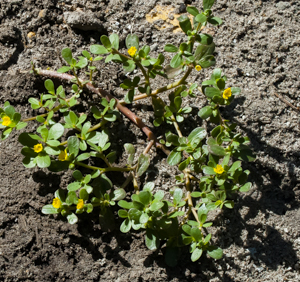
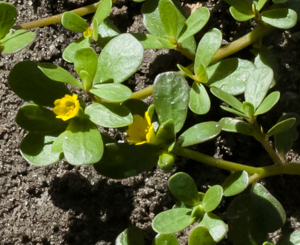
Family - Portulacaceae
Also known as - Purslane, Little hog weed, Fatweed, Pursley.
Found throughout Florida in open sunny locations, often on the sandy soils of fields, lawns, gardens, disturbed areas, a common summertime weed.
Fast growing, very drought resistant annual, succulent, fleshy leaves are glabrous, and obovate or spatulate in shape. Stems often tinted a pink or reddish color, spreading, prostrate habit of growth. Small yellow flowers in July, August.
Bitterweed - Helenium amarum
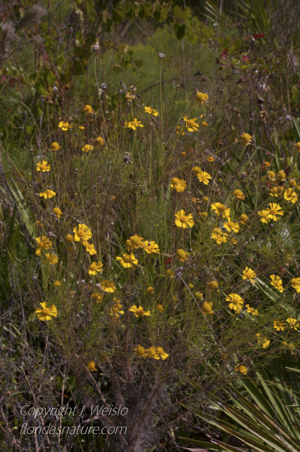
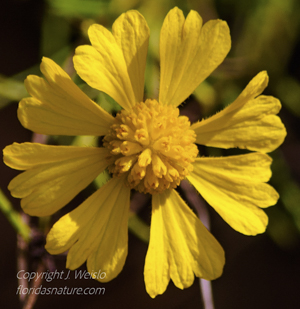
Family - Asteraceae (Aster family)
A.K.A. - Spanish Daisy, Bitterweed, Yellow Bitterweed, Yellowdicks.
An annual, many branching, herbaceous flowering plant, 1 -2 feet tall, native to Florida and the south central U.S. and northern Mexico. Composite flowers are yellow, 1 inch across with 5 - 10 ray florets and as many as 250 central disk florets. Leaves are sessile, linear to filiform (thread-like) and profuse.
The name bitterweed is derived from the fact that cattle that consume this plant produce bitter milk and meat.
Country Mallow - Sida cordifolia
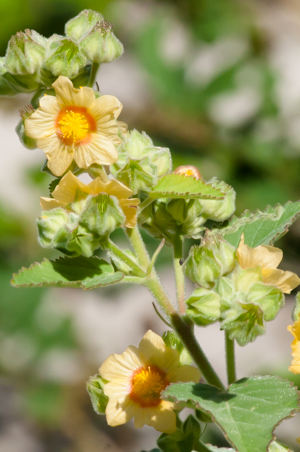
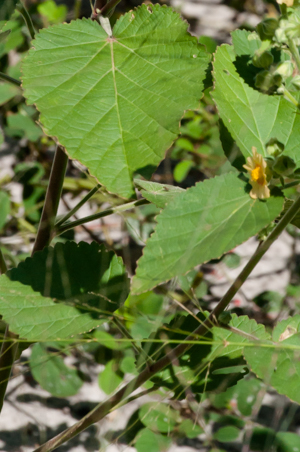
Family - Malvaceae (Mallow Family)
A.K.A. - Country mallow, ilima, flannel weed, heartleaf sida
Not native. Sida cordifolia is a perennial shrub/sub-shrub native to the India, it is considered an invasive weed in Florida.
Height may be up to 79 inches, more commonly 2-4 feet tall, entire plant is covered with fine hairs. Leaves are yellowish green, simple, alternately arranged on the stem with serrate margins, base of leaf is slightly cordate, leaf tips are obtuse or slightly rounded. Flowering occurs year-round in Florida, flowers are cream to deep orange-yellow with 5 petals and may or may not have a dark orange center.
Brownbud Allamanda - Allamanda cathartica
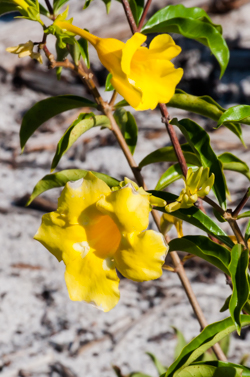
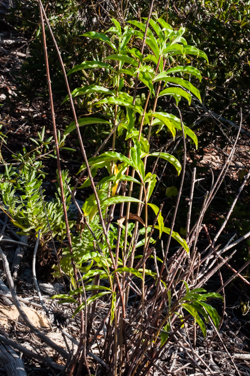
Family - Apocynaceae (Dogbane)
A.K.A. Golden Trumpet, Yellow Allamanda
Not native, from Brazil. Found in the wild in several Central and South Florida counties. Grows as a rambling, twining, woody stemmed evergreen vine or shrub with stems that may be up to 20 feet in length. Flowers through-out the year in warm climates.
Flowers are 3-6 inches across, funnel shaped with five lobes, a very showy yellow with white markings. Foliage is a whorled pattern of 2 - 4 opposite leaves at intervals along the stem, leaves are shiny green, leathery, 2 - 4 inches long, lanceolate in form with entire margins.